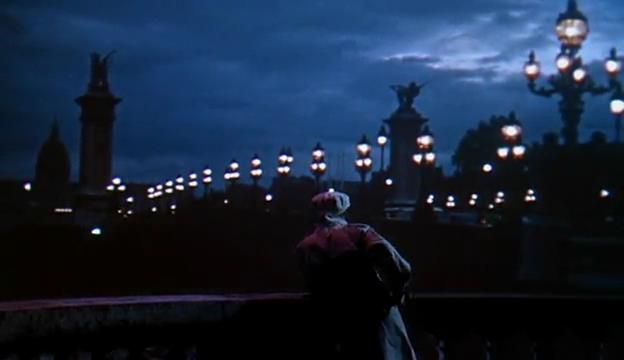The Five Pennies
They have a
value, assigned by song, dreaming, wishing, dancing, laughing, loving, in that
sequence.
Dance bands,
radio gigs with two guys in the booth who nix Bix, finally a tour that never
ends, a daughter in boarding school.
Polio lays her out, the horn goes into the bay for a
shipyard job (“No Experience Required”) that hacks the Axis till she can stand
on her own two feet at a club on Ventura Boulevard, then Red Nichols belts it
out.
A masterpiece by one of the cinema’s great directors.
Bosley Crowther of the New York Times calls it “highly palatable
schmaltz”, Halliwell’s Film Guide a “rags-to-riches success story”.
Houseboat
The technique of
the screenplay and the direction is a recurring rhythm of gag, childhood aperçu, symbolic expression, farce
structure, childhood drama, adult drama, it dices up the film into small
quantities that carry it along.
Thus
you have Cary Grant in a Laurel and Hardy, his kids, their crises and
adventures as stages of experience, the main plot centering on “the way of a
man with a maid” (Sophia Loren), the kids’ vicissitudes per se, and those of the adults.
Critics
have never grasped this, and it made Crowther vituperative in his review, but
it makes for a very enjoyable and original evening at the movies.
Shavelson
has one great trick of panning from an official view of Washington to a
comfortable hotel or a concert. The main effect of the structure is to absolve
the past by including it in the present, so that his film is a kind of thinking
machine full of vivid memories made actual.
Much
depends on Donatello (Harry Guardino), who says, “what a party! You shoulda
been there! Ya like broads?”
It Started in Naples
Viaggio in Italia (dir. Roberto
Rossellini), leading to Avanti! (dir. Billy Wilder).
The
main theme is Shelley, who after all wrote what he wrote.
The
intricacy of the construction appalled the critics, who missed the cabaret
satire (and the Presley ballad) amongst everything else.
A
defense of the island, a romantic fascination, give way to something else.
The
crucial point is De Sica’s speech in court assailing his client.
The
most serious business in comedy, yet dismissed “in a laughing Mediterranean
way.”
The
character is an American, because Whistler
v. Ruskin shares the theme.
The Pigeon That Took Rome
One of FDR’s, who had to
overcome the distance to Anzio (Dmytryk’s film is the natural complement to
this), a considerable impediment considered from top to bottom.
A terribly savage comedy in
its plain implications, preserving decorum for decorum’s sake, no laughing
matter if it comes to that.
“Haven’t you heard, sergeant?
This is a very funny war.”
“A good-fun comedy” (Variety). Too rich for Halliwell’s Film Guide by
halves, “heavy-going war comedy-drama” and so on, futilely.
A New Kind of Love

On the all-important basis of
Dieterle’s masterwork Fashions of 1934, Paris.
Which is to say that 34th
Street knockoffs meet shitsack newspaper columns in the City of Light, cf.
the central anecdote of Daniel Petrie’s The Bramble Bush.
Title from Chevalier, Feast of
St. Catherine, Cardin, Lanvin, Dior...
From this come variously What’s
New Pussycat? (dir. Clive Donner) and Crimes of Passion (dir. Ken
Russell), cf. Cukor’s Two-Faced Woman and Lubitsch’s Ninotchka.
“No-one would ever direct her to the men’s room again.”
Bosley Crowther of the New
York Times had no use for it or De Sica’s The Condemned of Altona or
Resnais’ Muriel or Castle’s The Old Dark House or Carreras’ Maniac
or Annakin’s Crooks Anonymous all on the same Halloween in Manhattan, “not especially funny.” Time Out, “laboured,
overdressed”. TV Guide, “tasteless farce.” Catholic News Service Media
Review Office, “slickly artificial... lame
contrivances... phony plot... largely unamusing and,
at times, tasteless.” Halliwell’s Film Guide, “very thin”.
Cast a Giant Shadow
“The first general of the army
of Israel in two thousand years,” Mickey Marcus of Brooklyn.
Kibbutzim and refugees, “an army of schnooks” up
against it for their very lives in 1948.
Col. Marcus is Pentagon planning, works with
generals, West Point man, Dachau is his assignment.
Early military operations in the Negev and on the
convoy route to Jerusalem.
Lean is cited from Lawrence of Arabia more
than once to make the point.
A confused, often superficial critic, Bosley
Crowther of the New York Times, noted
a “confusing, often superficial biography”. The same goes for Tom Milne (Time
Out Film Guide), “riddled with clichés and more than a bit
silly.”
Halliwell’s Film Guide makes
the sincerest effort to grasp Shavelson, “spectacular war biopic with all
concerned in good form”, but his wit as usual prevents that from happening to
any useful degree, “lacking the clarity and narrative control of a real smash.”
Another authority, Pauline Kael (The
New Yorker), records “hours of incoherence and banality”.